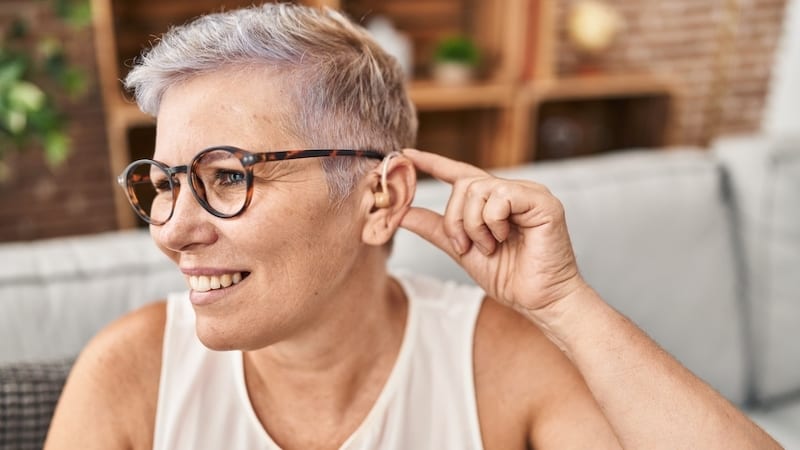The connection between unresolved hearing issues and cognitive decline has been well documented, so hearing care is brain care.
Though hearing loss is a common problem in older adults, many put off getting a hearing aid until their hearing loss becomes impossible to ignore. However, waiting too long can quietly take a toll – not only on the ability to hear, but also on brain health.
“Untreated hearing loss forces the brain to work harder to fill in missing sounds,” explains Dr. Rachel Artsma, senior audiologist at hear.com. “Because the auditory signals are weaker and less clear, the brain must constantly reconstruct and compensate, using energy that would normally support memory and thinking.”
That extra effort, known as cognitive load, can fatigue the brain over time. When so much mental energy is spent decoding speech, less is available for memory, focus, and problem solving. “That constant overexertion can increase the risk of cognitive decline or dementia,” Dr. Artsma says.
In another hearing-brain connection, hearing loss often leads people to withdraw from conversations and activities they once enjoyed. That loss of social connection means less mental stimulation, which is a problem not only for emotional and mental health, but also for long-term brain health. Addressing the issue can even help senior adults maintain their independence for longer.
“The good news is that hearing aids help slow or partially reverse this process,” Dr. Artsma notes. “By restoring clear, consistent sound, they keep the brain’s auditory pathways active and reduce cognitive effort. Conversations become easier and more enjoyable, energy levels rise, and social engagement returns – protecting both emotional well-being and long-term cognitive health.”
Spotting early signs
Hearing loss often creeps in so gradually that it is easy to miss, but noticing these subtle changes and taking action early can make a world of difference. People often begin by turning the television or music to a higher volume than normal, or frequently asking others to repeat themselves in conversation. Other early signs include hearing muffled voices, struggling to follow conversations in noisy environments, or hearing a persistent ringing in the ears (tinnitus). Many people start avoiding social situations altogether since listening and understanding feels exhausting or frustrating.
 According to Dr. Artsma, many people wait seven to 10 years after noticing hearing issues before seeking help. “Get a baseline hearing test in your 40s, recheck every few years, and yearly after age 60 – or immediately if you notice signs of hearing loss or communication challenges,” she recommends. “Acting on early signs by scheduling a hearing test and wearing hearing aids helps keep listening effortless, communication easy, and life more connected.”
According to Dr. Artsma, many people wait seven to 10 years after noticing hearing issues before seeking help. “Get a baseline hearing test in your 40s, recheck every few years, and yearly after age 60 – or immediately if you notice signs of hearing loss or communication challenges,” she recommends. “Acting on early signs by scheduling a hearing test and wearing hearing aids helps keep listening effortless, communication easy, and life more connected.”
Recent research supports this recommendation. The ACHIEVE randomized trial, published in The Lancet, found that best-practice hearing care slowed three-year cognitive decline in older adults at higher risk of dementia. The 2024 Lancet Commission update also reaffirmed hearing loss as a major modifiable dementia risk and emphasized the importance of early intervention. The ACHIEVE study also found that hearing care may help people maintain larger, more diverse social networks and reduce loneliness, which are two key factors for preserving cognitive function.
Breaking the stigma
If stigma is keeping you from seeking help, you are not alone. “For too long, hearing aids have been unfairly seen as a symbol of aging or decline,” Dr. Artsma says. “In reality, the opposite is true. Untreated hearing loss ages you far more by making conversations exhausting, leading to social withdrawal, fatigue, and even cognitive decline.”
She encourages people to see hearing care as empowerment, not decline. “Today’s models are tiny, discreet, and incredibly advanced. They don’t just improve hearing – they enhance confidence, social connection, and overall brain health.”
Cost has been a factor in keeping many people from addressing hearing loss, too. However, new laws allowing over-the-counter heading aids have made the remedy more accessible.
Taking action: hearing care is brain care
If you are unsure where to start, a simple hearing test is an easy first step. “A quick hearing test, a trial period, and expert support make it easy to experience the benefits firsthand,” Dr. Artsma says.
Loved ones can also play a crucial role in gently encouraging someone to seek care. “Approach the conversation with empathy, not pressure,” she advises. “Encourage a hearing test and offer to go with them. Frame it as a low-risk, high-reward opportunity to feel sharper and more connected.”
In addition, modern hearing aids are far removed from the bulky devices of decades past. “Today’s devices are tiny, rechargeable, and Bluetooth-smart,” Dr. Artsma says. “They quietly boost both hearing and mental vitality, and many report feeling more focused, energetic, and socially connected within weeks.”
Dr. Artsma emphasizes that hearing care is about more than sound – it’s about staying mentally and emotionally strong. “Protect your ears, stay socially and mentally active, and don’t wait for hearing loss to become severe,” she says.
Because, as she puts it, “Hearing aids aren’t a sign of aging – they’re a sign of living fully. Staying connected, engaged, and thriving is the best gift you can give yourself – and your brain.” After all, hearing care is brain care.





